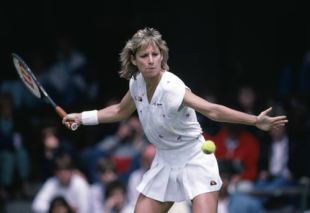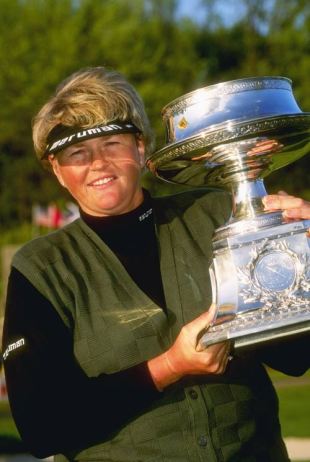- May 12 down the years
Evert Lloyd beaten at last

1979
Chris Evert Lloyd's record run of 125 consecutive matches won on clay ended in the semi-finals of the Italian Open, when she lost a tie-break in the third and final set to Tracy Austin, whose winning shot was one of her rare volleys, with her arms and legs in knots. Evert's streak began in August 1973 and peaked on April 16, 1978. After today, she won another 72 matches on clay before losing to Hana Mandlíková in the semi-finals of the 1981 French Open.
2010
Roy Hodgson's bid to become the first English manager to lift a European trophy since Sir Bobby Robson 13 years previously ended in heartbreak. Diego Forlan scored an extra-time winner as Atletico Madrid shattered Fulham's Europa League dream with a 2-1 victory in Hamburg. "I couldn't in my wildest dreams imagine we would get here when we started,'' Hodgson said after the game. "But unfortunately that doesn't help. It doesn't matter how much comfort I try to find, it is difficult to find joy or enthusiasm because a great performance has gone unrewarded."
1927
The legendary Joe Davis became snooker's first world professional champion. At Camkin's Hall in Birmingham, he took the first four frames of the final against Tom Dennis, led 7-1 at the end of the first day, and won 20-11. The match started on the 9th, two days after Davis lost the world billiards match to Tom Newman for the second year in a row. He beat Newman to win that billiards title in each of the next three years, and won the snooker championship the first 15 times it was held, up to and including May 18, 1946.
1975
Jonah Lomu was born in Auckland. Born to wow the world of rugby. When he scored two tries against Ireland in New Zealand's opening match of the 1995 World Cup, he was playing in only his third international. When he played in his first the year before, he was 19, the youngest player ever capped by the All Blacks. But it was in 1995 that he gatecrashed the scene. No other rugby player has had such an impact, in every sense. At 20 years old, he was 6' 5 and weighed over 18 stone, the bulk of which seemed to be in his legs. This was huge for a flank forward. As a winger - well, no-one had seen anything like him. Jonah the Whale headlines abounded. As England captain Will Carling smilingly said: a freak, and I wish he'd just go away. England had just borne the brunt of the Lomu Phenomenon. He scored four tries against them in the semi-final of that World Cup, and the way he scored his first, brushing aside two defenders before disentangling a third from his boots, was the memory of the tournament. But South Africa kept him in check in the final and he never won a World Cup winner's medal. He did score a record 15 tries in the competition - despite missing the 2003 tournament with the chronic kidney problem that required a transplant the following year. In 63 international matches, Lomu scored 37 tries, totals that would have been much higher if his health had held out. He scored a record eight tries against England alone, and won a gold medal in the rugby sevens at the 1998 Commonwealth Games. Carling was right: a freak - but we wanted him to stay a little longer.
1937
Beryl Burton was born Beryl Charnock in Leeds and married Charlie Burton when she was 17. They were still together 41 years later when she died as she lived: out cycling. One of the best and most versatile racers of all time, she was a world champion on the track (in the individual time trial five times) and the tarmac (the road race in 1960 and 1967). There would have been Olympic gold medals too, several of them, if the movement's attitude to women's sport hadn't kept cycling out of the Games until 1984. She won six other minor medals in the World Championships, from 1959 to 1973 - and her feats in British cycling are simply legendary. She won more than 70 national titles and was voted best all-rounder 25 years in a row. In 1967, she set a national record for distance covered in 12 hours which was further than the men's best. She actually overtook the men's record holder on the way - and the story goes that she worried about his energy levels, so she gave him a liquorice allsort as she pedalled past! Burton was a supreme advert for the restorative power of sport. Chronically ill as a child, she suffered from St Vitus's Dance and spent 15 months convalescing from rheumatic fever.
1912
As in 1908, there were two tennis tournaments at these Olympic Games. One outside, one inside today, when all the finals took place. Edith Hannam won two events. In the singles, she came through a desperately weak field to beat Sofie Castenschiold of Denmark 6-4 6-3 in the Final. In the mixed, she teamed up with Charles Dixon to win an all-British final against Roper Barrett and Helen Aitchison after losing the first set. The two men were among the top doubles players of their day, the two women weren't. Dixon lost the singles Final in straight sets to France's André Gobert, who'd won the doubles with Maurice Germot the day before. There were no women's doubles at the Olympics until 1920.

1996
Britain's Laura Davies regained the LPGA Championship she'd won two years earlier. One of the Majors in women's golf, the 1996 LPGA was reduced to only three rounds by heavy rain. In damp conditions on a tricky course, Davies shot a three-over-par 213.
1990
Harlequins became the only club to win the Middlesex Sevens five years in a row. This was their 13th title in all. England captain Will Carling was top try scorer in the competition with six, including two of the five in Quins' 26-10 win over Rosslyn Park in the final.
1984
Martin Girvan threw the hammer 77.54 metres to regain the Commonwealth record and set the British one that still stands.
1970
Mark Foster was born in Essex. Never at home in big swimming pools, he won only minor medals at the World and European Championships and reached only two Olympic finals. He did win gold in the 50 metres freestyle at two Commonwealth Games - but his main successes came in 25-metre pools. At 50 free and butterfly, he won six titles at the World Short-Course Championships and another ten at the Europeans, as well as setting assorted world records. He was the oldest ever champion in both short-course Championships (34 at the 2004 Worlds, 35 at the Europeans a year later) and won silver at the 2008 Worlds when he was 37. That year, he carried the flag at the Olympics but didn't make the semi-finals of the 50 freestyle. Those pesky long pools again.
1968
Graham Hill won the Spanish Grand Prix. It was the second race of the season, and he'd finished second in the first, behind former champion Jim Clark, who died on 7 April. In Clark's absence, Hill won in Spain from sixth on the grid, then in Monaco yet again on 26 May. He regained the title he'd last won in 1962, finishing well clear of runner-up Jackie Stewart.
1991
Reigning world champion Ayrton Senna won the Monaco Grand Prix for the third year in a row and the fourth time in all. He won it for a record sixth time on May 23, 1993. Here in 1991, he finished well clear of Nigel Mansell at Monaco and in the final standings.
1902
Joe Gans won the world lightweight title by knocking out Frank Erne. When the two met for the title two years before, Erne stopped Gans with a head-butt. Today he didn't get that close. Gans was known as the Old Master. He wasn't old in this fight, but master's the word. He dazed the champion with two early punches, drew blood with his next left jab, then landed a crushing right to the jaw. Erne fell slowly and didn't get up any faster. It was all over after 100 seconds of the first round.

